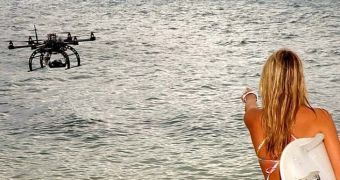The old favorite pastime of watching celebrities in the media is beginning to catch up with the times. Gone are the days when people would pick up magazines from the newsstand and then find out the latest gossip and dirt on their favorite stars. These days, technology means that you can keep an eye on them like Big Brother, 24/7.
TMZ reported last week on a worrying new trend that has the power to change the paparazzi industry forever and take it to new privacy-invading levels that clash with morality and decency. Sadly, the entertainment industry was never governed by morals but by cold hard cash, and since people are willing to pay big bucks to sit in the front row, this drone thing is going only one way: up.
A drone is basically a small remote-controlled helicopter. It's bigger than the models kids use to play around but it's smaller than one that needs to seat at least one person to operate the controls. To give you a rough idea, a drone needs only to be big enough to carry a photo camera and the lens to operate it.
The LAPD is already worried that several individuals have begun to use this kind of equipment to snoop and spy on certain individuals. They are worried because the current legislation means their hands are pretty much tied at the moment.
American law states that only objects flying over 400 feet (121 meters) need to comply with strict FAA regulations, anything below that is none of their concern. The problem is that the police don't have any law to help them regulate the use of drones.
At least some people have noticed this loophole and have already begun to use it. TMZ claims that at least one paparazzi agency, one of the biggest in the industry, has admitted to using drones to shoot footage of celebrity homes.
Reassuringly, they haven't yet tried to use them for shooting celebrities in their homes, but if celebrities somehow “accidentally” get into the shot, they won't stop shooting. The agency in question is called AKM-GSI and the head of the company, Steve Gisnburg, said he had to draw the line somewhere.
Though there is no law prohibiting him from shooting aerial footage of celebrity homes, he doesn't use footage with actual celebrities in it obtained by the use of drones. He claims that there would be a “huge backlash” for anyone attempting to do so.
What should be worrying us is the fact that he claims he's already been approached by freelance individuals who had this exact kind of footage but that he wouldn't buy it. So, at the moment, the only thing keeping us from seeing hundreds of drones milling about is the fact that the people in the industry still have some wits about them and the decency to know where to draw the line.
But rest assured that this won't last for long. The reason the drone footage with Miley Cyrus sitting in her backyard wasn't used was simply because of that: it just showed Miley Cyrus sitting in her backyard. Were it something more controversial, you surely would have seen it on the news.
All the paparazzi are waiting for is that one incident that is going to make it worth it for them to break their code of conduct.
Imagine, let's say, that a certain celebrity dies in his home and the only way to get footage is to sneak a small flying camera over the wall of the property where it manages to get a glimpse of the corpse. That video, based on the celebrity in question, could be worth a handsome figure to anyone who took it.
Though Ginsberg proudly claims that “We have the utmost respect for celebs and we stand by our word that we will not distribute any drone video capturing celebrities on public or private property,” that respect will fly out the window the next time a big scandal arises.
Don't get me wrong though, drones in themselves have proven to be a very useful concept, it's just that people have begun to use them in ways that aren't always the most straightforward. And as soon as that happens, society begins to question the morality of these small airborne pieces of technology, while celebrities flee in their homes at the smallest hint of a drone.
Pushing the envelope further, what's to stop these drones from spying on regular people next? What's to say that one evening, while you're sitting comfortably in your own home, one of these small critters doesn't pop up at your window and begins snapping photos of you? Should we all live then behind closed doors with the curtains drawn?

 14 DAY TRIAL //
14 DAY TRIAL //